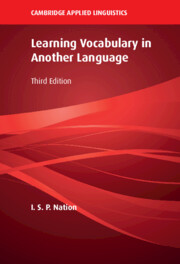Book contents
- Learning Vocabulary in Another Language
- The Cambridge Applied Linguistics Series
- Learning Vocabulary in Another Language
- Copyright page
- Contents
- List of figures
- List of tables
- Acknowledgements
- Introduction
- 1 The goals of vocabulary learning
- 2 Knowing a word
- 3 Teaching vocabulary and the roles of the teacher
- 4 Vocabulary and listening and speaking
- 5 Vocabulary and reading and writing
- 6 Learning vocabulary out of class
- 7 Vocabulary in specialised areas
- 8 Vocabulary-learning strategies and autonomy
- 9 Learning words from context
- 10 Word parts
- 11 Deliberate vocabulary learning from word cards
- 12 Finding and learning multiword units
- 13 Testing vocabulary knowledge and use
- 14 Designing the vocabulary component of a language course
- Book part
- References
- Author index
- Subject index
Introduction
Published online by Cambridge University Press: 02 June 2022
- Learning Vocabulary in Another Language
- The Cambridge Applied Linguistics Series
- Learning Vocabulary in Another Language
- Copyright page
- Contents
- List of figures
- List of tables
- Acknowledgements
- Introduction
- 1 The goals of vocabulary learning
- 2 Knowing a word
- 3 Teaching vocabulary and the roles of the teacher
- 4 Vocabulary and listening and speaking
- 5 Vocabulary and reading and writing
- 6 Learning vocabulary out of class
- 7 Vocabulary in specialised areas
- 8 Vocabulary-learning strategies and autonomy
- 9 Learning words from context
- 10 Word parts
- 11 Deliberate vocabulary learning from word cards
- 12 Finding and learning multiword units
- 13 Testing vocabulary knowledge and use
- 14 Designing the vocabulary component of a language course
- Book part
- References
- Author index
- Subject index
Summary
This introduction looks at where vocabulary fits in a language course, particularly in relation to the four strands of meaning-focused input, meaning-focused output, language-focused learning, and fluency development. It explores the main themes of the book through a small set of very powerful learning principles. It concludes by looking at how this third edition differs from the second edition which appeared in 2013.
- Type
- Chapter
- Information
- Learning Vocabulary in Another Language , pp. 1 - 7Publisher: Cambridge University PressPrint publication year: 2022

